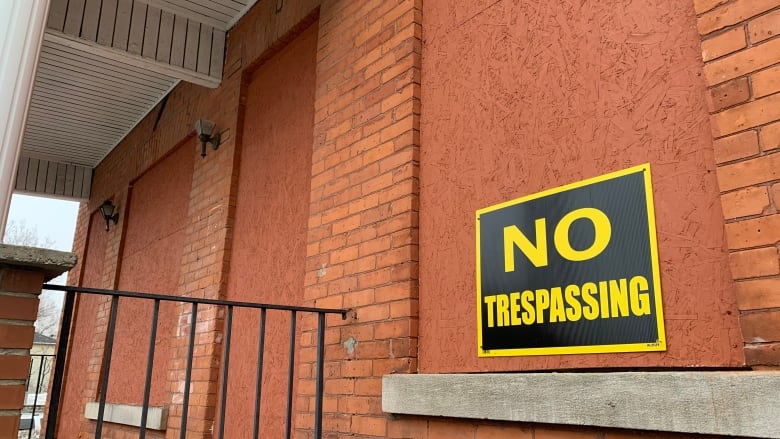Vacant unit tax brings in way more than forecast, but still irks some homeowners
New tax earned the city $11.5M last year, but some say it's not serving its stated purpose

Ottawa's vacant unit tax (VUT) is raking in millions more than expected, leaving some residents and one city councillor wondering whether it's a fix for the housing crisis or simply a cash grab.
The tax charges one per cent of the assessed value of homes left unoccupied for six months or more within one year. It's meant to push property owners to either put those units up for sale or rent them to address the city's housing shortage.
When council approved the tax two years ago, it was expected to bring in about $6.6 million per year. But city staff now say last year's revenue haul came to $11.5 million.
Orléans East-Cumberland Coun. Matt Luloff, a longstanding critic of the tax, asked staff for that information through a formal inquiry. He didn't like what he heard.
"I don't think that this program is truly doing what it was meant to do, which is to free up rental units — not to become a new income source for the City of Ottawa," said Luloff.
Luloff said he hasn't seen a clear measure of whether the tax is actually getting vacant homes back on the market. He also asked staff for more detailed information about how the revenue is being spent.
Staff responded that all of the money goes to fund affordable housing initiatives, minus about $2.3 million spent to administer the program, though they promised to get Luloff additional details.
Joseph Muhuni, the city's deputy treasurer for revenue, told CBC that VUT revenues are higher because there are almost twice as many vacant properties than initially estimated.
"I think the problem's a little bit worse than we thought it was going to be," he said.
Muhuni said he expects revenues will decrease in the years ahead, and called that "a measure of success." He said 1,700 units vacant in 2022 were occupied the following year, according to preliminary numbers, though roughly the same number of units became newly vacant.
'Growing pains'
Muhuni said the initial data from this year's tax cycle, which involves declarations for the 2023 occupancy year, suggests more homeowners are claiming exemptions, which cover anything from death to major renovations.
That could mean fewer appeals. In last year's cycle, which covered the 2022 occupancy year, 6,104 units were initially deemed vacant. More than half — 3,206 units — were the subject of an appeal. The overwhelming majority of those, for 2,736 units, were successful.
"A little bit of that was growing pains," said Muhuni. "I think this year we're in a much better position, and I want to say, I think subsequent years will even be better."
But Luloff thinks the tax is still targeting the wrong people. He said his office has been "inundated" with complaints from residents frustrated with the way the tax is administered.
He mentioned one woman whose home was left vacant while she cared for her ailing father.
"There are some contextual circumstances that require far more discretion in the administration of this program," said Luloff.
'Too bad, so sad'
Kara Brandwood reached out to CBC to call for precisely that kind of discretion. Brandwood lives in B.C. but owns two rental properties in Ottawa, and said she didn't declare they were occupied due to what she called "a perfect storm" of circumstances.
She said she was unaware of the new tax and didn't receive any notices for the 2022 tax year, partly due to being out of the country and partly due to the cessation of Canada Post's ePost service. The city withdrew $5,290 automatically through a pre-authorized property tax payment, she explained.
When Brandwood finally noticed the charge on her tax bill this year, she learned it was too late to appeal.
"I wasn't trying to go under the radar or do anything I wasn't supposed to do," she said. "I legitimately didn't hear about the program."
She called it "ludicrous" that she's still on the hook for $5,290, despite the fact that both of her properties were occupied by renters during the entire period.
"They said the matter is closed," Brandwood said of the city. "There will be no further discussion on their part with regard to this matter at all. So, too bad, so sad. You're out of luck."
In her view, the three-month appeal window is too brief and the process unduly complicated.
"The administrative burden of this kind of action makes me question whether I want to be a landlord anymore," she added.

Staff open to changes
At a meeting of council's finance and corporate services committee this week, Orléans South-Navan Coun. Catherine Kitts directed staff to fill a "gap" in the appeals process and explore amending the program to "allow property owners to declare their property status after the established appeal deadlines have passed."
Muhuni called the appeal window "reasonable," but said staff are open to looking at changes in line with Kitts's direction.
"We have seen some people, of course, that have been caught up in really, I would say, weird circumstances," he said. "And I think there's always opportunities for improvement."
In its response to Luloff, the city noted that the overwhelming majority of homeowners did declare by the deadline this year. Just 1,962 of 328,000 eligible properties missed the April 30, 2024, date for the 2023 tax year.
But Luloff called Brandwood's case senseless. If the goal of the program is getting people into homes, he said, that's precisely what she's doing.
"She's hit with this punitive fine when she is meeting the spirit of the policy," said Luloff. "I think that that's entirely unfair and something that needs to be remedied."

